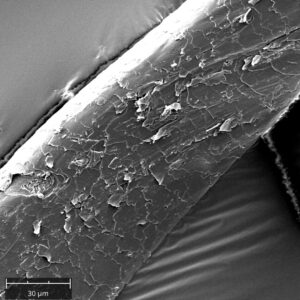An OU researcher is working with an SME on the best quality hair products for people who have curly or textured hair in a bid to promote wellbeing and guard against long-term negative health outcomes.
Dr James Bowen, who is a hair expert in the OU’s Faculty of Science, Technology, Engineering and Mathematics, works with CURLiD to research the best products for people with curly hair to use.
His research draws on a recent report which identified a possible link between the use of certain chemicals found within products that have straightening capabilities, and uterine cancer.
This builds on previous research which found an association between these chemicals and a higher risk of hormone-sensitive cancers including breast and ovarian cancer. Elevated risks were specifically associated with people who used straightening products over long periods.
Dr Bowen highlighted the potential wider health benefits of their approach:
“There is a stigma around textured hair in society which at times are upheld by policies relating to physical appearance. There is also a discrepancy in the current market share of textured hair care products vs straight hair products, compared to how many people have textured hair.
“The average cost of products for textured hair is higher than the average cost of straight hair products, and there is a lack of salon offerings for people textured hair. This impacts the cost, availability and accessibility of services, but also specifically the quality of hair stylist training or the lack thereof when it comes to textured hair.”
“To achieve either straight hair, or straight-appearing hair, people with textured hair may run significant health risks by turning to products which have straightening capabilities but possible links to cancer. They may also use heat styling tools which damage their hair, or wear restrictive hair styles which may induce hair loss conditions,” said Dr Bowen.
The researchers have already worked with 34 curly-haired people to analyse their hair fibres. They used the OU’s Electron Microscopy suite, enabling CURLiD to visualise the microscale topography of each hair fibre in multiple locations. These measurements were supported by trichological (hair and scalp) analyses of dryness, damage, porosity, and elasticity.
 They concluded that there is a connection between the products used, the wash/care routine, cutting frequency and the hair fibre condition.
They concluded that there is a connection between the products used, the wash/care routine, cutting frequency and the hair fibre condition.
Product build-up, dehydration, hair shaft damage, and split ends were commonly-observed negative effects and participants were provided with safe, cost-effective product recommendations and hair care practices that are best suited to their hair type, budget, and lifestyle, enabling them to achieve their desired hair goals.
Rachel Marcelin, one of the founders of CURLiD, highlighted how much she values the relationship which has been established:
“I am deeply honoured and humbled by the collaboration with the Open University. This partnership represents a significant step forward in our mission to empower individuals with textured hair. Having personally experienced the challenges of hair loss, as well as the isolating and discriminating experiences within salon and work environments, I am passionate about creating positive change.
“Together, with the support of the OU, we’re not just addressing personal struggles but also contributing to a larger cause. This collaboration fills me with hope and gratitude, knowing that we’re making strides to tackle issues that have affected myself and others for far too long.”
As a result of these findings, and with support from the OU’s Open Societal Challenges funding programme, Dr Bowen and CURLiD aim to study a total of 1,000 hair samples from across the UK by 2027. Dr Bowen added:
“Regardless of hair type or background, our ambition is to empower individuals with textured hair to access to resources and support for maintaining healthy hair and scalp, fostering inclusivity and empowerment within the curly and textured hair community.”
“The large quantities of product often required to achieve a finished look, combined with the cost-of-living crisis, means many people find themselves in difficult situations regarding how to present and care for their hair.”
“Encouraging people to embrace their natural hair will generate psychological benefits and consequently positive health-associated impacts of improved self-esteem. Reducing the use of certain hazardous chemicals including endocrine-disrupting compounds and carcinogens will generate further health benefits in the longer-term.”



